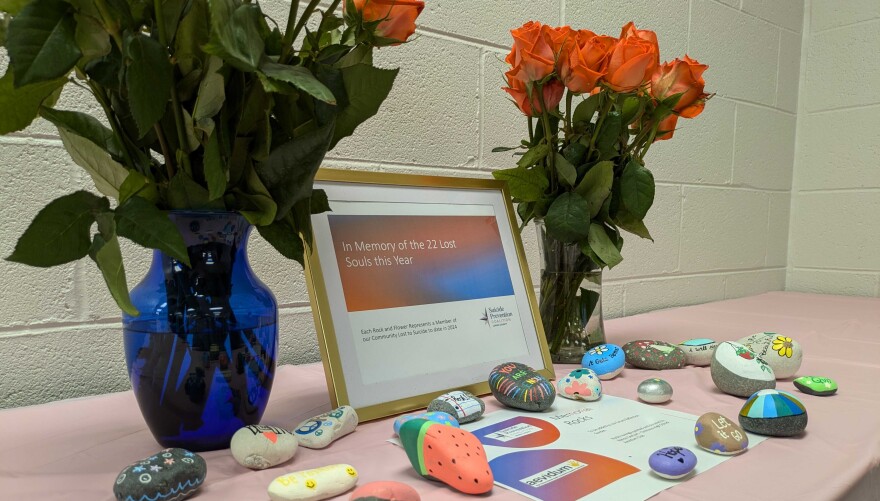EDITOR'S NOTE: This article contains potentially distressing content involving suicide. If you or a loved one is going through a crisis, dial 988 to reach the Suicide and Crisis Lifeline.
ALLENTOWN, Pa. — As CEO of the United Way of the Greater Lehigh Valley, Marci Lesko has spent her professional career building connections and pointing people to where they could find help.
So it was a shock to her when at her darkest hour four years ago — her husband's suicide — she didn't know where to go.
"Not one single person provided comfort. Not one. Not the paramedics. Not the first responders. No one followed up. No one called us. No one said, 'Here's a pamphlet. Here's a resource. Here's a phone number,'" Lesko said.
A partnership of Lehigh County nonprofit groups is now working to make sure that people in Lesko's position aren't left searching for answers alone.
A year after securing a $197,000 federal grant to launch the project, the Local Outreach for Suicide Survivors, or LOSS Team, has made contact with 20 of 22 Lehigh County families who lost a loved one to suicide this year.
"We don't want another parent to know what it's like when you come home and you go to sit down at your table and to know what that empty chair feels like."Nancy Salomon, mother
The 12-member LOSS Team is a mix of mental health professionals and volunteers, nine of whom have lost a loved one to suicide themselves. Their goal is to provide a stabilizing force for families whose worlds have suddenly been turned upside down in the hours or days after their loss.
The team includes Nancy and Todd Salomon, a galvanizing force behind the project's creation. The Lower Macungie Township couple's 13-year-old son Craig took his life in 2020, and the Salomon family has thrown itself into suicide prevention programs since.

Studies show that those with connections to victims of suicide such as family members, classmates and co-workers are at higher risk to die by suicide than the general public. While the couple said it's still too painful for them to respond to scenes of a suicide, they feel a calling to be a support to those abruptly confronting an unspeakable loss to help prevent someone else from becoming part of that statistic.
"We don't want another parent to have to I.D. their child," Nancy Salomon said before pausing to gather herself. "We don't want another parent to know what it's like when you come home and you go to sit down at your table and to know what that empty chair feels like."
Downward trend
Deaths by suicide among Lehigh County residents had been declining since 2016 when the Lehigh County Coroner's office reported 62 suicides. After jumping up to 49 in 2020, suicides are back on a downward trend. Thirty-eight people died by suicide in 2023, and the county has reported 22 suicides so far this year.
According to the most recent figures from the CDC, Pennsylvania saw 14.2 deaths by suicide per 100,000 residents in 2022. By comparison, Lehigh County's suicide rate was 10.6 deaths per 100,000 that year.
While the improving rate is encouraging, Pinebrook Family Answers CEO Brian Vogler said there's still work to be done. The program could use more volunteers willing to undergo the training to assist bereaved families, he said. To prepare volunteers entering emotionally charged situations, they undergo extensive training, including role playing exercises to drive home the emotional spectrum they may run into, he said.
While many of their volunteers are people who have experienced the loss of a loved one from suicide, that isn't a prerequisite to join the LOSS Team, he said. The program is just the fourth of its kind in Pennsylvania; Northampton County has its own LOSS Team as well.
Lawmaker's experience
U.S. Rep. Susan Wild, D-Lehigh Valley, was on hand at Pinebrook Family Answers on Friday to commemorate the progress the LOSS Team has made since earning the grant.
Aside from helping the nonprofit organization secure the funding for the program, Wild has a personal interest in its development. Months after taking office in 2019, her life partner Kerry Ackers died of suicide.
Acker's death shocked the family. Wild remembered being at a loss of how to react, and the people around her didn't know how to respond. While society has prepared people how to react when someone dies of cancer or a heart attack, the stigma attached to suicide had created a void, she said.
While that has started to change as people have become more open about mental health struggles, the need for support groups remains. Wild recalled the loneliness she felt after Ackers death, the question of how to break the news to her adult children and the lack of direction she felt once he was gone. She said it was rewarding to see a program that can help people grappling with those questions.
"This kind of organization, it will change their entire trajectory post-suicide," Wild said.
To learn more about the LOSS Team or find tools to assist people grieving a death by suicide, visit www.SuicidePreventionLC.org.


